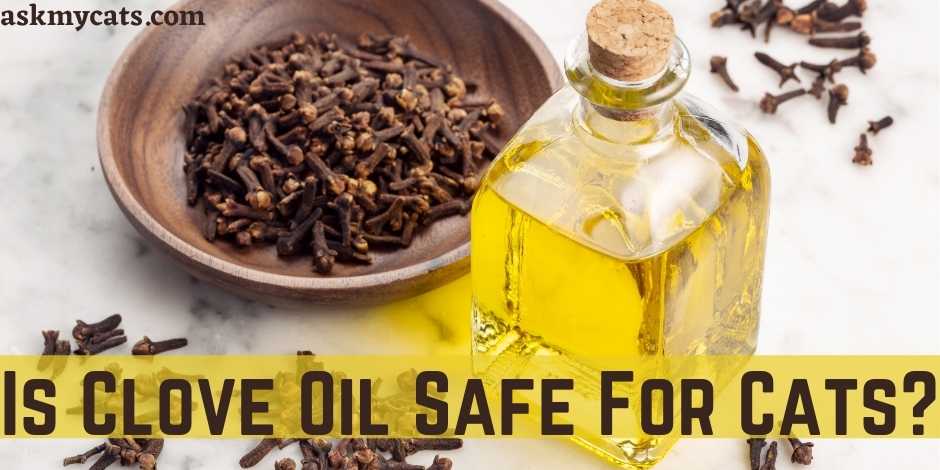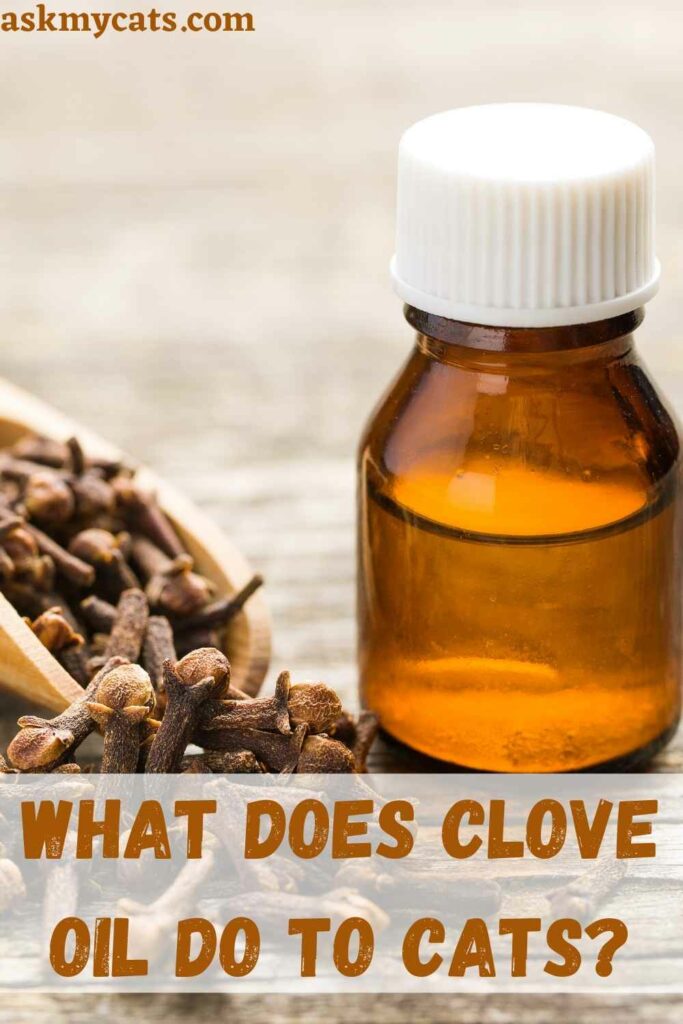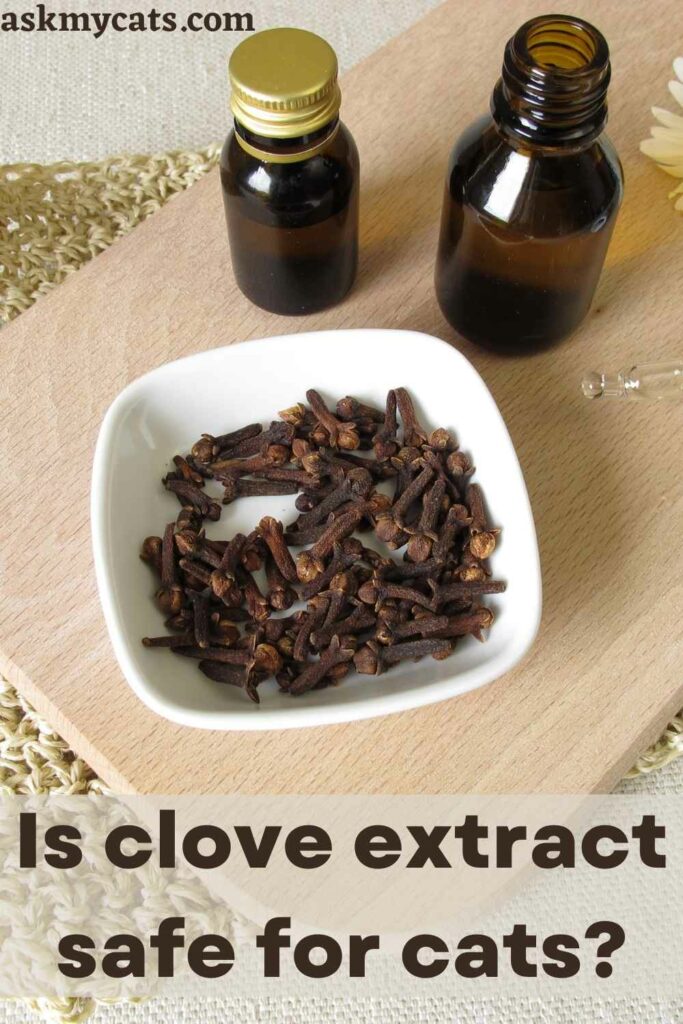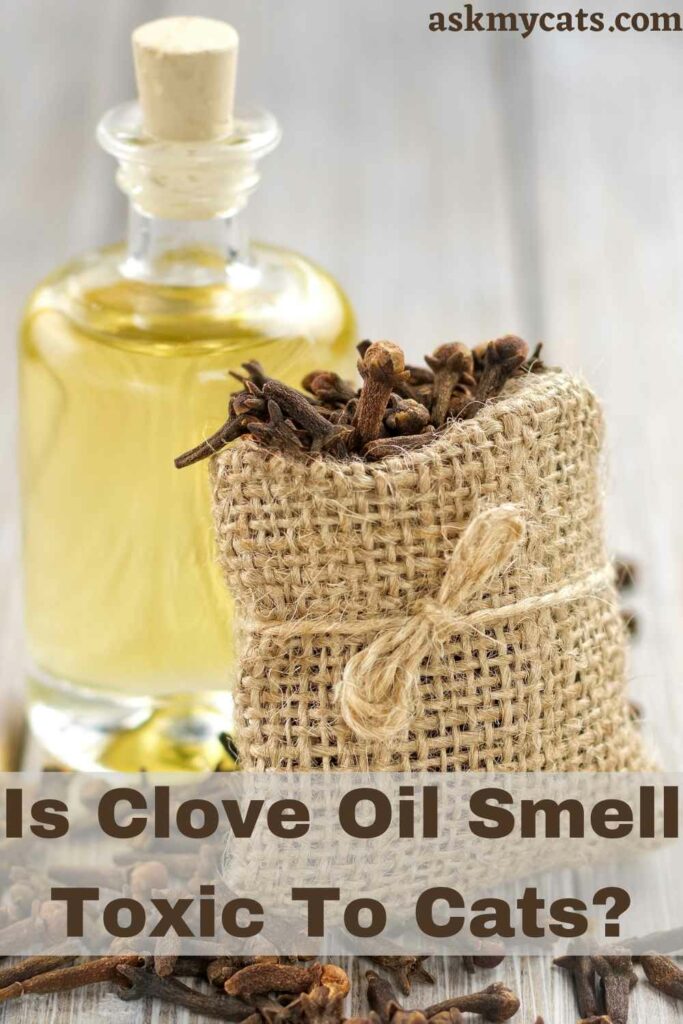Natural products and essential oils have remained popular for a long time. While you may find that using essential oils for aromatherapy, such as lavender or eucalyptus, helps you relax, keep in mind that these oils can be dangerous to pets and other people.
Many essential oils have been reported to be toxic to our furry friends. Cats, in particular, metabolize things differently than humans, and there have been reports of many essential oils being toxic to our furry friends.
So, is clove oil safe for cats?
No, clove oil is not safe for cats. Clove oil, whether applied to the skin or diffused, is toxic. Clove oil and pennyroyal oil (both commonly used for natural flea control) have been linked to liver damage, vomiting, diarrhea, seizures, and other issues.
This article will talk about is clove oil safe for cats and can you use clove oil around cats.


Give Your Cat the Perfect Day
Get the Free Ebook!
Cat Licked Clove Oil
If your cat licked clove oil contact your vet immediately and get her to immediate medical care.
It’s critical to get a diagnosis and treatment as soon as possible. If you suspect your cat has ingested clove oil, contact your veterinarian or the Pet Poison Helpline (800-213-6680), a 24-hour animal poison control center. The sooner you seek treatment for your cat, the better the prognosis and outcome.
Do not force your cat to vomit or give him activated charcoal. This could make your cat’s condition worse. Place the product packaging in a sealed container and bring it to the veterinary clinic with you. If any product gets on your skin or fur, wash it off as soon as possible with a liquid dishwashing detergent.
Clove oil contains chemicals that are quickly absorbed through the skin or orally. The liver is responsible for the metabolism of many of these chemicals.
Cats are especially sensitive to essential oils because they have fewer of the liver enzymes needed to effectively metabolize them.
In addition, kittens and young cats, as well as cats with liver disease, are more vulnerable to their effects. Clove essential oil can irritate or burn the skin and mouth.
What Does Clove Oil Do To Cats?
If your cat ingested clove oil it shows various signs of poisoning like vomiting, upset stomach, and lack of coordination.

Keep an eye out for a lack of coordination. Your cat may be unable to walk properly if it has been poisoned by essential oils.
As if inebriated, it might trace a crooked line across the floor, weaving this way and that.
You might notice a general slowness of motion or a lack of energy in less severe cases.
Keep an eye on your cat for tremors. Poisoning may cause your cat to shake or shiver.
Essential oil poisoning in cats can result in seizures, which are an extremely violent form of uncontrollable shaking.
A seizure in your cat is a medical emergency, and you should contact your veterinarian right away.
Keep an eye on your cat’s temperature. Tremors in your cat may or may not be linked to a drop in its core body temperature when you notice them.
If you notice your cat shaking, take its temperature with a pet thermometer. The normal body temperature of your cat is around 101.5 degrees Fahrenheit (39 degrees Celsius)
Look for any signs of skin irritation. Redness and irritation of the skin are also signs of essential oil poisoning in cats.
This is especially true when the cat’s skin has been treated with essential oil. On the lips, tongue, and gums, you may notice swelling, bumps, blistering, or redness.
Look for issues with your cat’s eating. It’s possible that your cat’s vomiting is caused by essential oil poisoning. If the cat’s vomit smells like the essential oil he was recently exposed to, you’re probably dealing with essential oil poisoning. A less severe symptom related to digestion could be a sudden loss of appetite or disinterest in eating.
Does Clove Oil Deter Cats?
Yes, clove oil can deter cats.
Cats have a habit of chewing everything from remote controls to blankets to shoes and furniture. To save your belongings (and your sanity), spray deterrent spray on the items they’re most likely to chew.
Using vinegar or citrus oil, you can easily make a chewing deterrent spray. You can also rub some clove oil on the items that are the most “chewable.”
The bitter taste will keep your fluffer away from your belongings. Because chewing is a natural habit for canines, it’s also important to provide them with something to sink their teeth into.
Household items such as ropes, old t-shirts, and denim can be used to quickly create DIY chewable toys.
Do Cats Like Cloves?
The majority of cats do not like cloves because of their smell and taste, however, every now and then there are some exceptions.
According to Patton Veterinary Hospital, large amounts of cloves or clove oil are dangerous to cats because they contain eugenols. In cats, eugenols can cause liver toxicity, which can manifest as vomiting, seizures, and staggering.
Is Clove Extract Safe For Cats?
No, clover extract is not safe for cats.

Clover extract can cause chemical burns in cats if it comes into direct contact with their skin.
Chemical burns and other toxic effects can occur if a cat licks up spills of clover extract.
Many essential oils are particularly irritating to cats, and even a couple of licks can be fatal.
Clove extract is poisonous to cats. Whether applied to the skin or used in diffusers, these are toxic.
Tea tree extract and clover extract (both commonly used for natural flea control) have been linked to liver damage, vomiting, diarrhea, seizures, and other issues.
Diffuser oil can still be harmful because it diffuses tiny oil droplets into the air using water vapor.
If the diffuser is used in a small space or for a long time, inhaling diffused oils can cause aspiration pneumonia, as well as other toxic effects.
If you’re going to use clove extract in your home, make sure your cats have a way out. If odors are too strong, use pure products and dilute oils instead, and avoid using in the presence of birds.
If you do decide to keep your diffuser, make sure it’s in a location where your cat won’t be able to knock it over and be exposed to the oils.
Is Clove Oil Smell Toxic To Cats?
Yes, the clove oil smell is toxic to cats.

Some cats may develop a watery nose or eyes, as well as a burning sensation in the throat, after inhaling strong odors or fragrances.
Pets may experience breathing difficulties or become nauseous, resulting in drooling and/or vomiting.
You may notice labored breathing, fast breathing, panting, coughing, or wheezing in a cat who is having difficulty breathing.
Please don’t think it’s just a case of hairballs. Please notify your veterinarian.
Cats with such symptoms should be moved to fresh air as soon as possible, and they should seek emergency veterinary care if their symptoms do not improve quickly.
Cats with pre-existing respiratory issues, such as asthma or airborne allergies, or cats who are exposed to secondhand smoke from their human companions, are more likely to develop severe respiratory irritation.
Then there are active essential oil diffusers, which release actual microdroplets or particles of oil into the air along with the oil’s pleasant aroma.
Nebulizers and ultrasonic diffusers are examples of these. These droplets could collect on your cat’s fur, where they could be eaten or absorbed into the skin.
Depending on the type of essential oil used and the dose is given to the cat, symptoms such as drooling, vomiting, tremors, ataxia (wobbliness), respiratory distress, low heart rate, low body temperature, and liver failure may occur.
Frequently Asked Questions
How to keep the cat away from clove oil?
Keep your essential oils out of the reach of your cat. Cats are explorers by nature. However, if your cat ingests, inhales, or comes into contact with concentrated essential oils, the poisoning will be more rapid and severe. As a result, store your clove oil in a high, out-of-the-way cabinet that your cat is unlikely to access. Place your clove oil bottles in a resealable plastic bag and store them in your locked cabinet if they emit a strong scent even when not sprayed. Clove oil should be avoided by your cat. If you’re going to spray clove oil in a room, keep your cat in another room, and don’t let it back in until the scent has faded. Oils should not be used for more than two weeks at a time to avoid low-level buildup. Wait at least one week before using essential oils again. By opening a window or turning on a fan, you can hasten the dissipation of essential oils.
Can clove oil kill cats?
Although it is unlikely, clove oil can kill cats, if ingested by your cat in large volumes and your cat not getting the required medical attention quickly.
What is a safe use of essential oils?
Any essential oil can be harmful to cats’ health, especially if used incorrectly or in excess. Essential oils should still be diluted or diffused. To keep your cat’s environment safe, use them in moderation. Artificial fragrances and air fresheners are probably less safe for cats than essential oils. Even so, what your nose perceives as a pleasant odor may be too much for your cat to handle. If you’re going to use essential oils around cats, make sure you have a scent-free room for them to retreat to.
Final Words
If you’re thinking about bringing clove essential oil into your home, think twice. Do your homework and talk to your family veterinarian about it. Every cat is different. Never apply known irritants directly to your cat’s skin, and in the event of accidental poisoning, call the Pet Poison Helpline.
If you have any questions ask us in the comments section.

I have an oil painting Brush Dip prepared commercially with artist grade safflower oil and is 2% clove leaf oil. It’s meant for brushes to be dipped in to keep them pliable and this does make the room smell like cloves. I’m not diffusing clove oil but should I avoid anything around my cats that smells like clove?
As a general rule, it is always a good idea to keep essential oils and other potentially toxic substances out of reach of cats. While clove oil is not highly toxic to cats, it can still cause some adverse effects if ingested or if a cat comes into contact with it on their skin. Symptoms of clove oil toxicity in cats may include vomiting, diarrhea, drooling, and difficulty breathing. In severe cases, clove oil toxicity can lead to liver damage.
If you are using a brush dip that contains clove oil, it is best to keep it in a location where your cats cannot access it. If you do need to use the brush dip while your cats are present, it is a good idea to keep them in a separate room or to use the brush dip in a well-ventilated area. You should also be sure to wash your hands thoroughly after using the brush dip to avoid accidentally transferring the clove oil to your cats.
In general, it is a good idea to use caution when using any essential oils or other potentially toxic substances around your cats. If you have any concerns about the safety of a particular product, it is always best to consult with a veterinarian or a professional before using it around your pets.
Thank you!
I threw some essential clove oil drops onto the floor and cupboard to deter ants. I am afraid my cats walked into because I smelled it on their fur which was a sign that they were around that area. I immediately thought of toxicity-of course I didn’t think of it at the time when throwing it around. I tried to wipe their fur with water and tissues but I don’t think it is helping. I pray they are not poisoned. But they seem to be ok.